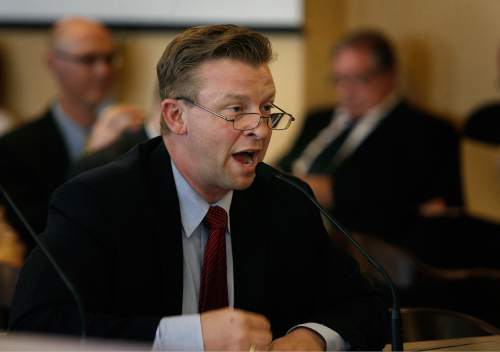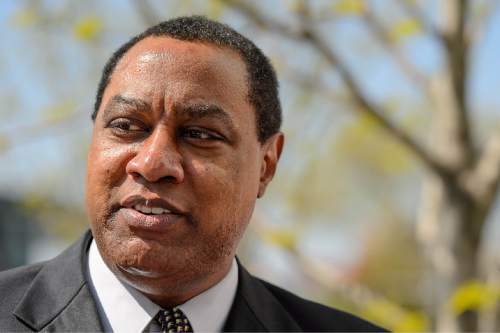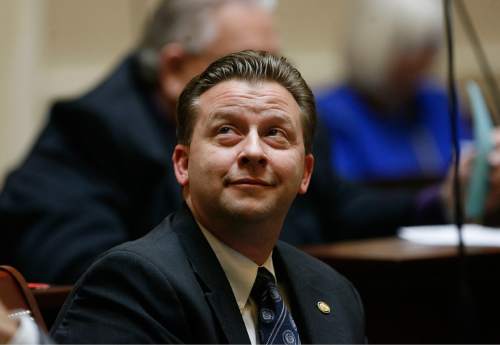This is an archived article that was published on sltrib.com in 2016, and information in the article may be outdated. It is provided only for personal research purposes and may not be reprinted.
Sen. Todd Weiler became the first Utah legislative candidate to collect the required number of signatures to claim a spot on the primary election ballot, and more than 20 more candidates, including U.S. Sen. Mike Lee, have filed their intent to gather signatures.
But squabbles within the Republican Party mean it will be weeks before Weiler or any other GOP candidate will know for sure if their signatures are valid.
Utah Republican Party Chairman James Evans sent a letter to the state elections office this week, asking it not to verify any signatures submitted by candidates until after March 1, the deadline for the party to declare who is eligible to vote in the Republican primary.
Traditionally, the party has allowed all registered Republicans to cast primary ballots, but Evans said those rules could change and he won't know for sure who the party will allow to vote before the March 1 deadline.
Under a new election law, SB54, only those eligible to vote in the primary may sign a candidate's petition. That means until the party declares who can vote, the signatures cannot be verified and the results cannot be certified.
Still, Mark Thomas, director of the elections office, said he has instructed county clerks to do a preliminary verification of the signatures based on the database of registered Republicans. If the party's eligibility rules change, he said, they will go back and review the signatures.
Evans said it would be against the law for the lieutenant governor's office to go ahead with verifying signatures and "if the [lieutenant governor's office] is not going to comply with the law, then we'd have to file for an injunction" in court to halt the process.
Weiler, R-Woods Cross, expressed frustration with Evans' delays and gamesmanship.
"The only uncertainty is the uncertainty being created by James Evans. The statute is very clear. … None of the other political parties seem to have this problem," Weiler, an attorney, said. "I'm not going to be distracted by them."
Weiler said he is confident his signatures will qualify and he will be a candidate. If some signatures are disqualified, he has more he can file and will gather more, if necessary.
The senator said it is unclear how Evans plans to redefine voter eligibility and whether he plans to "excommunicate" registered Republicans from the party.
Evans said that is not his plan.
"It's not even worthy of a response because it's just not true," he said.
Evans said the party changed its standards for membership last year, and now to be eligible to vote in the Republican primary, a voter has to be a registered Republican and comply with the party's constitution and bylaws.
What that means is unclear, and Evans said he would look at "any additional information we encounter" to decide eligibility of the 600,000-plus registered Republicans. And that eligibility could be changed again when the party's central committee meets early next month.
Rich McKeown is co-chairman of the group Count My Vote, which proposed a ballot initiative to provide the signature-gathering option to get on the ballot, then backed off when it reached the compromise in SB54. He said Evans is obstructing the process and out of line with the will of voters.
"At every step of the way … the Republican Party, under the leadership of its chair, has concluded that it will circumvent the will of the people, the will of the Legislature and the signature of the governor, and it's to the point they're creating serious ambiguity and uncertainty for candidates," McKeown said. "They're making it very, very difficult on everyone involved and seem to be enjoying it along the way."
Evans said he is merely following the law and complying with SB54, and he expects everyone to do the same.
Sixty-six candidates have filed their intent to gather signatures, all of them Republicans, with the exception of Vaughn Cook, who has filed to run as a Democratic candidate for governor, and Salt Lake County Mayor Ben McAdams, who is seeking re-election.
It is unclear whether gathering the required number of signatures will even assure a candidate a spot on the primary ballot.
Lt. Gov. Spencer Cox has said he will put anyone who gathers the signatures on the ballot, but Evans has insisted the law gives the party the right to decide how its candidates are nominated and Republican nominees will continue to be chosen by delegates at the party convention.
Evans has said that if a candidate only gathers signatures and doesn't go to the party convention and receive at least 40 percent of the delegates' support, the party will seek to have the signature-gathering candidates disqualified.
Cox has said that, if the party takes that route, it may lose its status as a qualified political party and only those candidates who gather signatures will end up on the ballot.
Both sides plan to ask a court to resolve the dispute.
Twitter: @RobertGehrke







